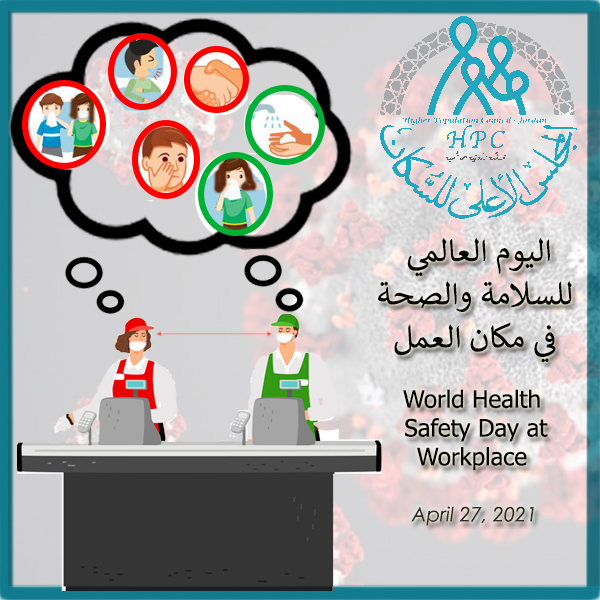

Jordan joins the world Today Wednesday in celebrating the annual World Day for Safety and Health at Work and which marks the 28th of April of every year. This year’s theme is to “Anticipate, prepare and respond to crises and invest now in resilient OHS systems”.
The Secretary General of the Higher Population Council Abla Amawi indicated in a press release special to this occasion that the coronavirus pandemic is considered a global challenge for safety and health at the work place, as workers are at risk of being infected by this virus and work places have become locations for the outbreak of this virus as a result of the close contact between workers and bad ventilation.
Amawi added that no government capable of maintaining the health of citizens without maintaining the health and safety of health personnel, as workers in emergency wards and healthcare face professional and health risks. The Ministry of Health estimations also indicate that the infection rate among workers in the health sector and their families is much higher than the infection rate in society, as it ranges from 5 to 7 times the rate among the population. The number of workers in the health sector reaches around 30 thousand workers in nursing occupations, 10346 among who work in the private sector and the rest work in formal sectors. The number of doctors who work for the Ministry of Health is around 6 thousand female and male doctors, a third of them whom are specialists.
Amawi drew attention to the importance of creating awareness of health protection among workers in economic establishments and how work places could be of vital importance to stop the spread of the coronavirus and controlling it. She also drew attention to the role suitable safety and health measures in the work place could play an instrumental role in controlling the spread of this infection while also protecting workers and society as a whole. She also added that the government and employers and employees have roles they need to play in handling this pandemic, outlining that the last statistics from the Social Security Corporation indicate that incidents and infections at work the Corporation was informed of reached around 15 thousand work place infections a year, at a rate of an infection every 40 minutes approximately. A death caused by infection also occurs every two days.
In the area of the importance of analyzing gender in professional health and safety for its effect on policy-making and creating protection measures, Amawi affirmed that realizing differences and diversity is considered a primary matter in strengthening safety and security to provide healthier work places for all workers. She also added that professional health and safety measures for all workers do not always achieve the intended benefits and especially for female workers and that the effects of the roles of the two sexes on health need more thorough analyzing to develop a better understanding of the relationship between professional health and social and economic roles of women and men, as well as the fact that the approaches that take into consideration the inequality between the two sexes make the differences more obvious.
She also explained that despite the measures undertaken to contain the coronavirus pandemic which included lowering the number of social security subscriptions, providing unemployment for a temporary period, the disbursement of wages for over 960 thousand insured female and male workers and allowing women with children in the third grade and under to work remotely, the pandemic still produced challenges for Jordanian women concerning their roles in contributing to covering the expenses of the family and some of them losing their jobs, as well as the extra domestic burden for women and the extra care needs of the family.
Concerning the most important recommendations on safety and health at the work place, the Higher Population Council recommended the importance of creating a health service unit at the level of each organization and which is entrusted with protective functions primarily. The unit is also responsible for advising employers and employees on how to maintain a safe and healthy work environment. The Council also recommended the importance of helping employers and employees undertake appropriate measures at the work place and supporting professional health risk management at health-care facilities as well as ensuring the continuity of responding to emergencies and primary healthcare services. It also recommended promoting a preventive national culture for safety and health; providing consultancy information and services and training on professional health risks; collecting data and doing research on professional health risks; activating the measures and protocols specific to work sectors to protect from and deal with the coronavirus pandemic such as (the need for social distancing, work from home arrangements, responding to positive cases of coronavirus at the work place, providing personal protection equipment, secure movement to and from the work place, protection from wrongful dismissal and providing satisfactory wages and benefits to ensure compliance with quarantine); as well as the importance of creating a national system for professional health risks and establishing a national policy in this area.







